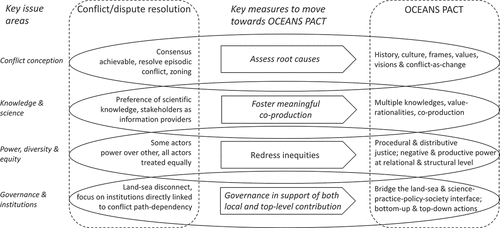Figures & data
Figure 1. The rows on the left of the figure show four key issue areas (these include processual and ambition aspects) to consider when engaging in and addressing marine conflicts (i.e. Conflict conception, Knowledge & science, Power, diversity & equity and Governance & institutions). The column on the left shows how these key issue areas tend to be considered and addressed by a conflict/dispute resolution approach (which we argue is the conventional approach to engaging in ocean conflict). The arrows in the middle show transformative steps required to move to an OCEANS PACT driven approach (what we call conflict transformation). It is important to that note the Conflict/Dispute Resolution and OCEAN PACT columns are conceived as endpoints in a continuous scale, rather than as binary pairs. These endpoints should not be viewed in absolute terms but rather in relative terms in any particular conflict context. The OCEANS PACT column describes how this approach differs in considering and addressing the four key issue areas of marine conflicts and thereby the possibility of advancing contextualized and ‘institutionalizable’ sustainability pathways.

